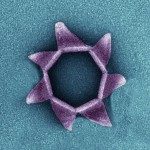Lien vers Pubmed [PMID] – 16121167
Nature 2005 Aug;436(7054):1101-2
Viruses are thought to be functionally inactive once they are outside and independent of their host cell. Here we describe an exceptional property of a newly discovered virus that infects a hyperthermophilic archaeon growing in acidic hot springs: the lemon-shaped viral particle develops a very long tail at each of its pointed ends after being released from its host cell. The process occurs only at the temperature of the host’s habitat (75-90 degrees C) and it does not require the presence of the host cell, an exogenous energy source or any cofactors. This host-independent morphological development may be a strategy for viral survival in an environment that is unusually harsh and has limited host availability.

